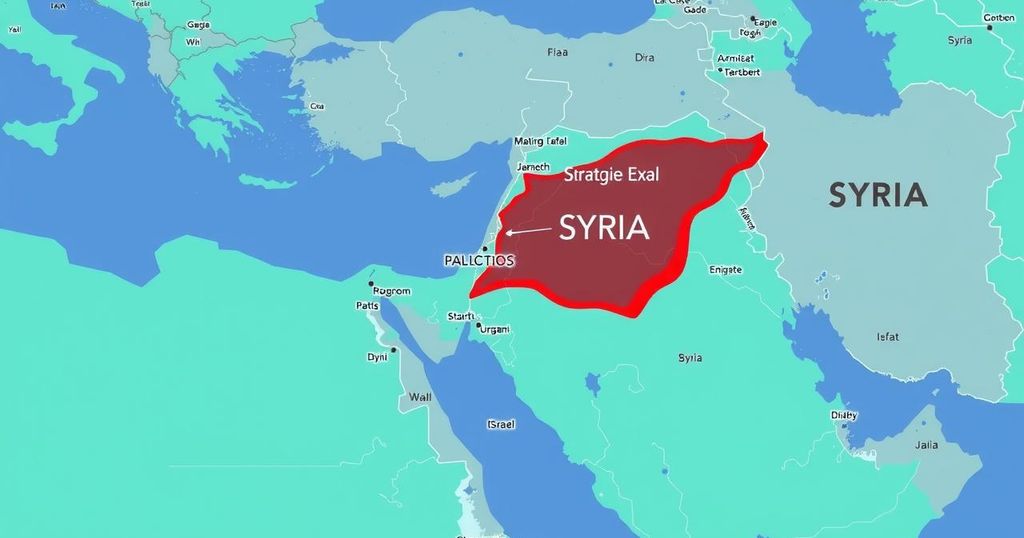Following the fall of Bashar al-Assad, Israel perceives strategic opportunities in Syria’s chaos. Prime Minister Netanyahu’s government advocates for territorial expansion through alliances with minority groups. Military actions have escalated against Assad’s remnants, raising the stakes for regional influence. Amidst evolving dynamics, Israel aims to solidify its power while navigating concerns of a potential Islamist regime near its borders.
On December 2022, following the ousting of Syrian dictator Bashar al-Assad by Islamist rebels, Israeli Prime Minister Benjamin Netanyahu perceived significant opportunities for Israel from Syria’s instability. His government aims to leverage this chaos to implement a new vision for the Middle East, which includes fragmenting Syria into federally governed autonomous regions. Foreign Minister Gideon Sa’ar emphasized the need for a stable federal Syria that acknowledges diverse lifestyles.
In the wake of conflicts ignited by Hamas’ attack on October 7 and subsequent regional tensions, Netanyahu has emphasized transforming the Middle East to favor Israeli interests. He interprets the evolving situation in Syria as a result of Israeli initiatives, seizing the chance to extend territorial control and influence through alliances with minority groups along Syria’s borders.
Netanyahu’s directives led to increased military engagement shortly after Assad’s ouster, marking a departure from Israel’s previous detente with the Assad regime. This military action has included hundreds of airstrikes against Assad’s remnants and seizing key tactical locations in Syria, notably Mount Hermon. Israel has vowed to prevent the Syrian regime from posing a security threat.
Historically, Israel’s border with Syria had remained stable since the 1967 war. However, recent Israeli incursions have caused these borders to blur. For decades, the Assad regime had maintained control through authoritarian rule while facilitating Iranian influence in the region, particularly aiding Hezbollah against Israel. The emergence of Ahmed al-Sharaa as Syria’s new leader presents opportunities for a shifted dynamic as he claims to distance himself from direct confrontation with Israel.
Israeli officials assert the necessity of a sustained military presence in Syria to protect local Druze and Kurdish communities. The Druze, residing close to the Israeli-occupied Golan Heights, are viewed as critical allies. Israeli Defense Minister Israel Katz has condemned Sharaa’s violent crackdown on Alawite communities, addressing the precarious nature of his regime amidst increasing sectarian strife.
Diplomatic developments are ongoing, with Sharaa demonstrating a shift towards reconciling with the minorities Israel is courting. This includes a recent landmark agreement with Kurdish-led forces. Analysts note that while Israel’s actions are motivated by fears of an Islamist regime emergence, the consequent violence may spiral into broader conflict, particularly if Sharaa’s interim government does not address Israeli incursions.
As Netanyahu seeks to align with the Druze, he publicly committed to defending them against the radicalization of Syria’s new leaders. Some Druze have rejected this overture, perceiving it as expansionism, while others have formed a militia in response to fears of Sharaa’s regime. Meanwhile, Israel is reaching out to Syria’s Kurdish communities, urging international support against threats from Turkey.
Outside powers are also eyeing Syria’s shifting landscape. Turkey plans to expand its military footprint in Syria with Sharaa’s backing and seeks to cement its influence. Saudi Arabia has expressed interest in engaging with Sharaa to reassert its regional dominance. Conversely, Russia’s role has waned amid changing dynamics, with Israel pushing for a weaker and decentralized Syria. Netanyahu reaffirmed Israel’s commitment to thwart any threats emerging from Syria, underscoring its strategic objectives in the region.
In conclusion, the recent upheaval in Syria presents Israel with unique strategic possibilities, allowing for territorial expansion and increased influence amid internal chaos. Netanyahu’s government is actively pursuing military engagements and regional alliances to secure Israeli interests, particularly with regard to minority communities like the Druze and Kurds. The broader geopolitical landscape surrounding Syria remains complex, with various regional powers striving for dominance while Israel aims to counter potential threats near its borders.
Original Source: www.cnn.com




